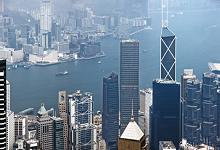
Typical street scene in Santa Ana, El Salvador. (Photo: iStock)
IMF Survey: Hong Kong SAR Weathers Global Economic Storms
January 17, 2013
- Hong Kong SAR expected to grow 3 percent, fueled by strong domestic demand
- Property sector poses main domestic risk to outlook
- External shocks, including euro crisis and U.S. fiscal negotiations continue to pose a threat
Resilient domestic demand has helped Hong Kong Special Administrative Region brace itself against the effects of an uncertain global economy, say IMF economists.

View of Hong Kong SAR from Victoria Peak. Robust domestic demand has helped Hong Kong SAR offset the drag from weak external demand (photo: Massimo Borchi/Corbis)
ECONOMIC HEALTH CHECK
In their yearly report on the economic health of Hong Kong SAR, the economists say timely fiscal policy support, strong construction activity, and buoyant tourism have helped offset the drag from weak external demand.
Robust domestic demand, and the gathering momentum of the Mainland economy, means Hong Kong SAR is expected to grow at a healthy 3 percent in 2013, up from a projected 1¼ percent in 2012.
Property remains largest risk
The report identifies the property sector as the principal source of domestic economic risk, with a low probability, in the near term, of a correction significant enough to have broad macroeconomic and financial repercussions.
Prices have doubled since bottoming out in 2008, and increases in the mass market segment have been particularly sharp recently. The report says that appropriate macroprudential policies—including tighter ceilings on mortgage loan-to-value ratios—have helped protect financial stability by strengthening lending standards and boosting bank buffers.
“These measures could be fine-tuned as risks evolve, but it is important that macroprudential policies stay focused on safeguarding financial stability,” said Steven Barnett, the Fund’s mission chief.
“Other policies—for instance, ensuring a steady supply of land and residential units, including through public housing—can best be used to address broader concerns about demand-supply imbalances and affordability. “
Repercussions from global developments
The report cautioned that an intensification of the euro area crisis or renewed uncertainties surrounding U.S. fiscal negotiations would adversely affect Hong Kong SAR’s small and highly open economy.
“Trade and financial services are key sectors in Hong Kong SAR, which leaves the economy susceptible to global and regional shocks,“ said Barnett.
“In the event of an external shock, fiscal policy should provide further stimulus while protecting low-income and vulnerable households,” he added.
“But it is important that fiscal policy be adjusted symmetrically through the business cycle, with stimulus withdrawn once the recovery takes hold. Ultimately, fiscal discipline has been the backbone of Hong Kong SAR’s economy and has served it well in absorbing external shocks.”
The report says that external bank distress, particularly shocks originating in the United States or Mainland China, would have a large impact on Hong Kong SAR’s banking system. The existing liquidity facilities and deposit protection scheme should prove sufficient to maintain financial stability, but, in an extreme shock, Hong Kong SAR could consider additional measures in collaboration with other jurisdictions.
Promoting inclusive growth
The assessment says that the high degree of economic flexibility and importance of skilled occupations in Hong Kong SAR’s economy, while sources of strength and resilience, could also result in growing income inequality.
It added that a range of steps have already been taken to address concerns about income inequality and the strain placed on household budgets by rising housing costs—including the statutory minimum wage and planned increases in public housing.
“Weight should continue to be placed on policies that reinforce existing social welfare programs and provide support and opportunities to lower-income households,” said Barnett.
Credibly sustaining the exchange rate regime
The IMF maintained its support for Hong Kong SAR’s currency regime, the Linked Exchange Rate System, which pegs the Hong Kong dollar to the U.S dollar, as the best arrangement for Hong Kong SAR.
The report noted that Hong Kong SAR’s strong fiscal position, robust and proactive financial oversight, and flexible labor, product, and asset markets allowed Hong Kong SAR to credibly sustain the exchange rate regime.


